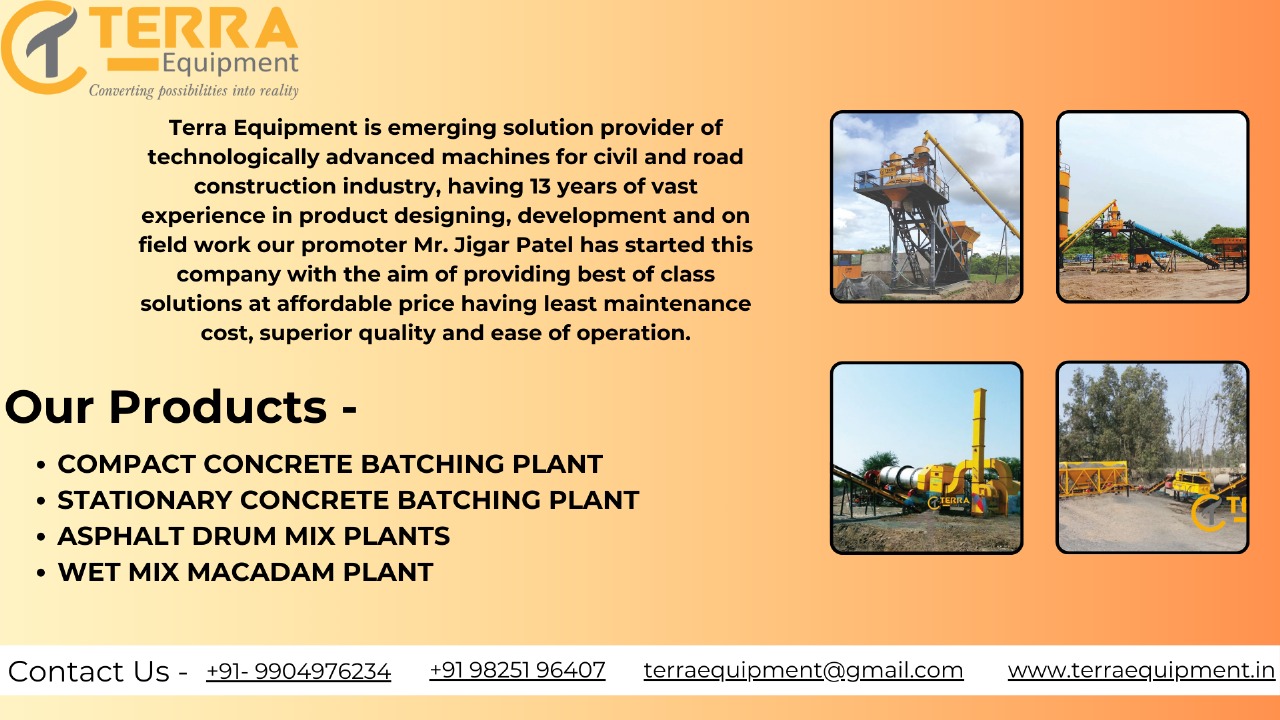Stationary
Concrete Batching Plant
A Stationary Concrete Batching Plant is a central
facility where various materials such as cement, sand, water, and aggregates
are combined to produce high-quality concrete in large volumes. As the name
suggests, it remains fixed at one location and is typically used for long-term
or high-volume construction projects like dams, bridges, airports, highways,
and large buildings. These plants are equipped with highly automated systems to
ensure consistent concrete quality and efficient operation.
10
Frequently Asked Questions (FAQs)
- What
is a Stationary Concrete Batching Plant?
It's a fixed facility for mixing concrete in large volumes, used for long-term projects. - How
does it differ from a mobile batching plant?
Stationary plants are fixed and have higher production capacity, whereas mobile plants can be moved from site to site. - What
are the components of a batching plant?
Cement silos, mixers, conveyors, aggregate feeders, control systems, and weighing systems. - What
type of projects require stationary batching plants?
Large-scale infrastructure like roads, bridges, dams, and industrial buildings. - What
types of mixers are used?
Twin-shaft mixers, planetary mixers, and pan mixers depending on concrete type and volume. - Is
automation possible in these plants?
Yes, most stationary batching plants are fully automated with advanced PLC control systems. - How
is concrete quality controlled?
Through computerized control systems, precise weighing, and batching of ingredients. - What
capacities are available?
Capacities typically range from 30 m³/hr to 240 m³/hr or more. - What
are the maintenance needs?
Routine inspections, lubrication, cleaning, and periodic calibration of equipment. - Are
they environmentally friendly?
Yes, with dust collectors, recycling systems, and water management options, they can be environmentally sustainable.
Applications
- Road construction
- Bridges
and flyovers
- Airports
- Large
commercial complexes
- Power
plants
- Hydroelectric
projects
- Prefabricated
concrete product manufacturing
Features
with Uses
|
Feature |
Use/Function |
|
Twin-shaft mixer |
|
Automated control panel |
Easy monitoring and accurate batching |
|
Aggregate bins with weighing systems |
Precision in material ratio and batching |
|
Cement and fly ash silos |
Safe storage and dispensing of powders |
|
Conveyor belts & screw conveyors |
Efficient material transport |
|
Dust collection system |
Maintains clean environment and complies with emission
norms |
|
Water dosing system |
Controls water-cement ratio for concrete consistency |
|
Additive dispensers |
Allows use of plasticizers, retarders, etc. |
Key
Points
- Fixed location installation
- High
production capacity
- Precision-controlled
batching
- Ideal
for long-term and high-volume projects
- Often
equipped with computerized control
- Requires
trained operators and regular maintenance
- Large
footprint; needs permanent foundation
Handling
& Operation
- Installation:
Must be done on leveled ground with proper foundation.
- Calibration:
Regular calibration of weighing scales is critical.
- Operation:
Operated via control panel by trained personnel.
- Maintenance:
Includes cleaning mixers, oiling moving parts, and checking electrical
systems.
- Safety:
Follow all site and equipment-specific safety protocols (e.g., emergency
stop, dust masks, ear protection).
Benefits
- High accuracy and consistency in concrete mix
- Cost-effective
for large-scale production
- Reduces
manual labor and human error
- Improves
project timelines
- Can
support simultaneous casting operations
- Environmentally
optimized options available
Conclusion
A Stationary Concrete Batching Plant is an
indispensable component in large-scale construction, providing consistent,
high-quality concrete with minimal operational interruption. Its robust design,
scalability, and automation capabilities make it the top choice for
infrastructure and industrial projects. Proper handling, maintenance, and
operation are crucial for optimal performance and longevity.
Contact
Us For More Details On :-
Call :- +91 98251 96407, +91 99049 76234
Email :- terraequipment@gmail.com
Address :- Survey No- 231, Dediyasan Village, Opp Lilaba
Weigh Bridge , Mehsana -384002 Gujarat
Facebook :- www.facebook.com/people/TerraEquipment/100063801460520/?ti=as
Instagram :- www.instagram.com/terraequipment
Youtube :- www.youtube.com/c/TerraEquipmentmehsana
Website :- www. terraequipment.in

